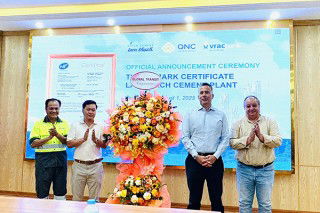Lafarge Africa Plc has released its financial results for 2Q16, reporting a total revenue of NGN107bn (US$344.9m). Cost of sales stood at NGN92.2bn (US$297.3m), down from NGN98bn (US$315.9m) in the same period last year and administrative/distribution and other expenses dropped to NGN12.2bn (US$39.3m) from NGN4bn (US$45.1m). The company’s revenue of NGN30.8bn (US$99.3m) fell by NGN28.5bn (US$91.9m) due to foreign exchange loss after the naira’s devaluation. The company also suffered diminished production as a result of gas supply shortages in southwest and east Nigeria, with occasional plant repair works.
Chief Executive Officer of Lafarge Africa, Michel Puchercos, said that, “In spite of the macroeconomic challenges and market uncertainties, our company will continue to deliver good performance with significant upsides to come as we conclude on the integration journey to form Lafarge Africa Plc. The new organisation is much stronger and better positioned to deliver operational excellence and improve value to our shareholders.”
Lafarge Africa has recently fully acquired UNICEM, after being a majority shareholder (53 per cent) in 2015. UNICEM operates the Mfamosing plant, which has its 2.5Mta capacity doubled in 2014. This new line is expected to be commissioned by the end of 2016. Lafarge currently has a total of US$495m in external borrowing on its books, which are debts contracted by UNICEM. To show confidence in UNICEM, Nigerian lenders have bought into a NGN60bn naira bond issuance by Lafarge Africa to refinance the naira component of UNICEM’s debt. It is the largest corporate bond issuance in Nigeria.
In 2Q16 Lafarge Africa recorded innovative steps towards the use of alternative energy fuels. The company is looking to run as many as its plants as possible on AF due to gas supply being restricted to 30 per cent of normal volumes as a result of gas infrastructure breaches by militants in the Niger delta. This negatively impacted operations for eight weeks, particularly at the Sagamu plant. Mr Pucheros commented on the matter, saying, “Industrial operations were significantly impacted by gas supply shortages in the South West & East Nigeria operations with occasional plant repair works. As a result, EBITDA stood at NGN12bn, as against NGN48bn in H1 2015.”

Quang Ninh Cement achieves double certification win
Quang Ninh Cement Co’s Lam Thach plant in Halong Bay region, northern Vietnam, is the first ceme...